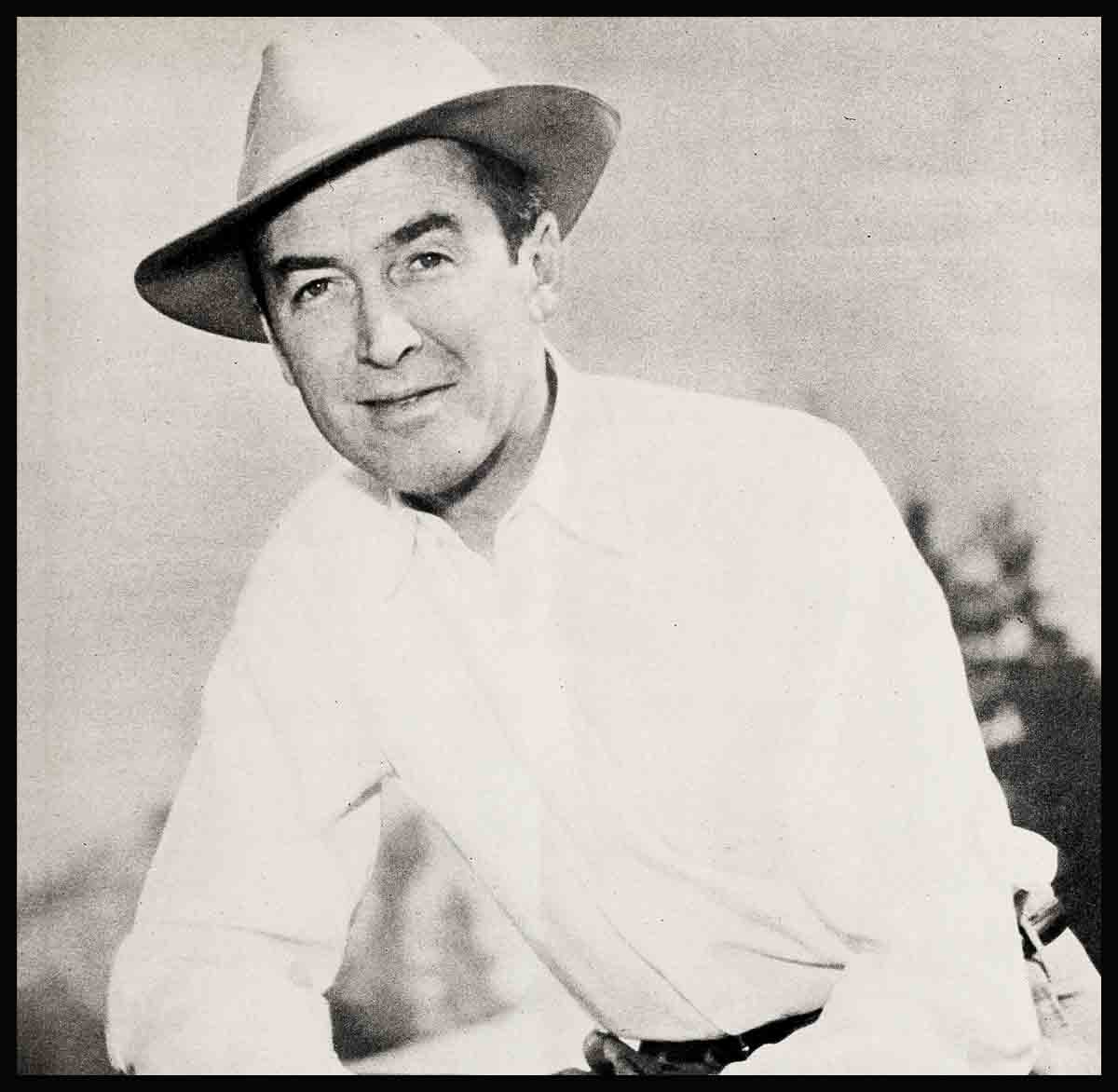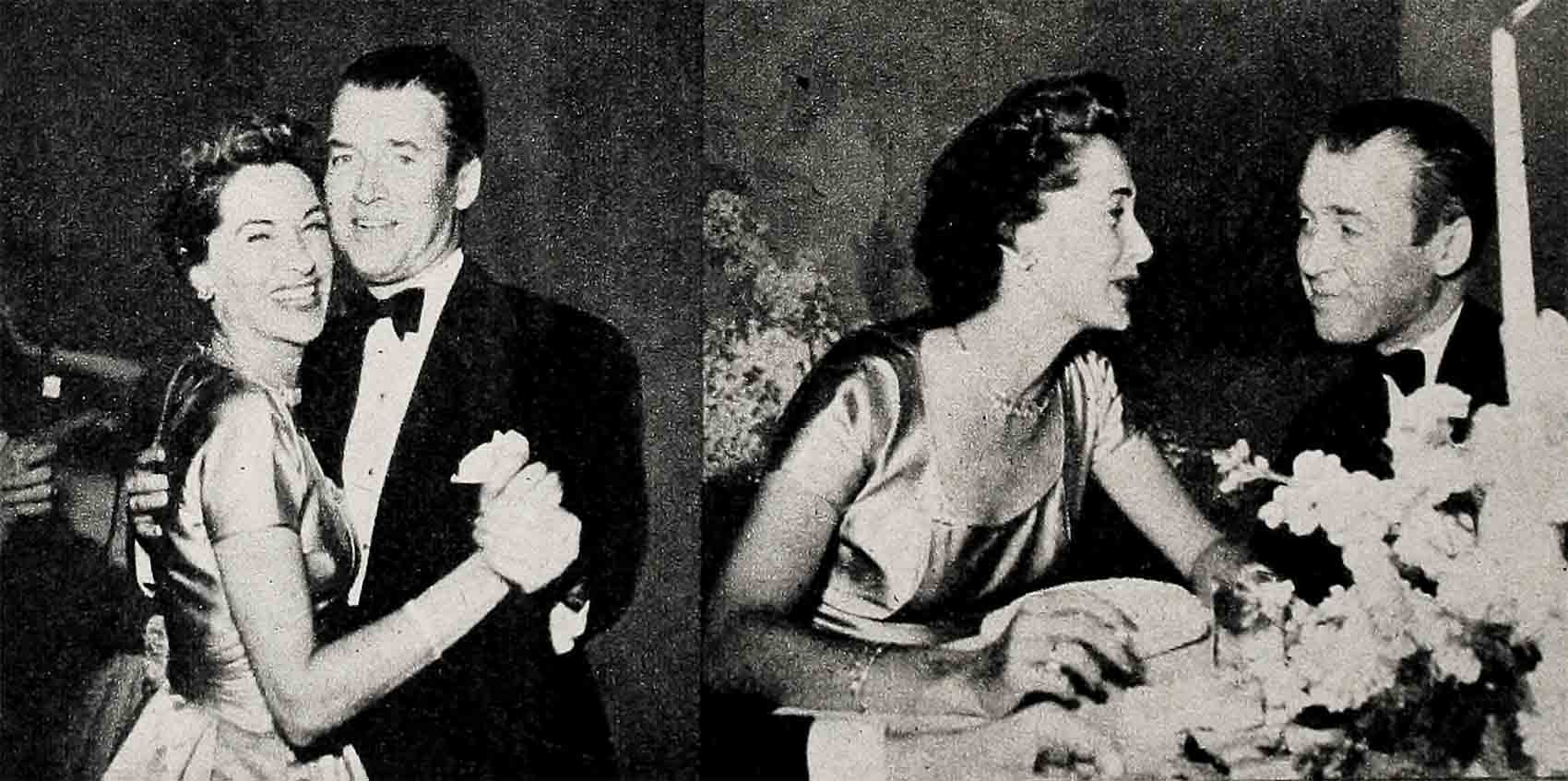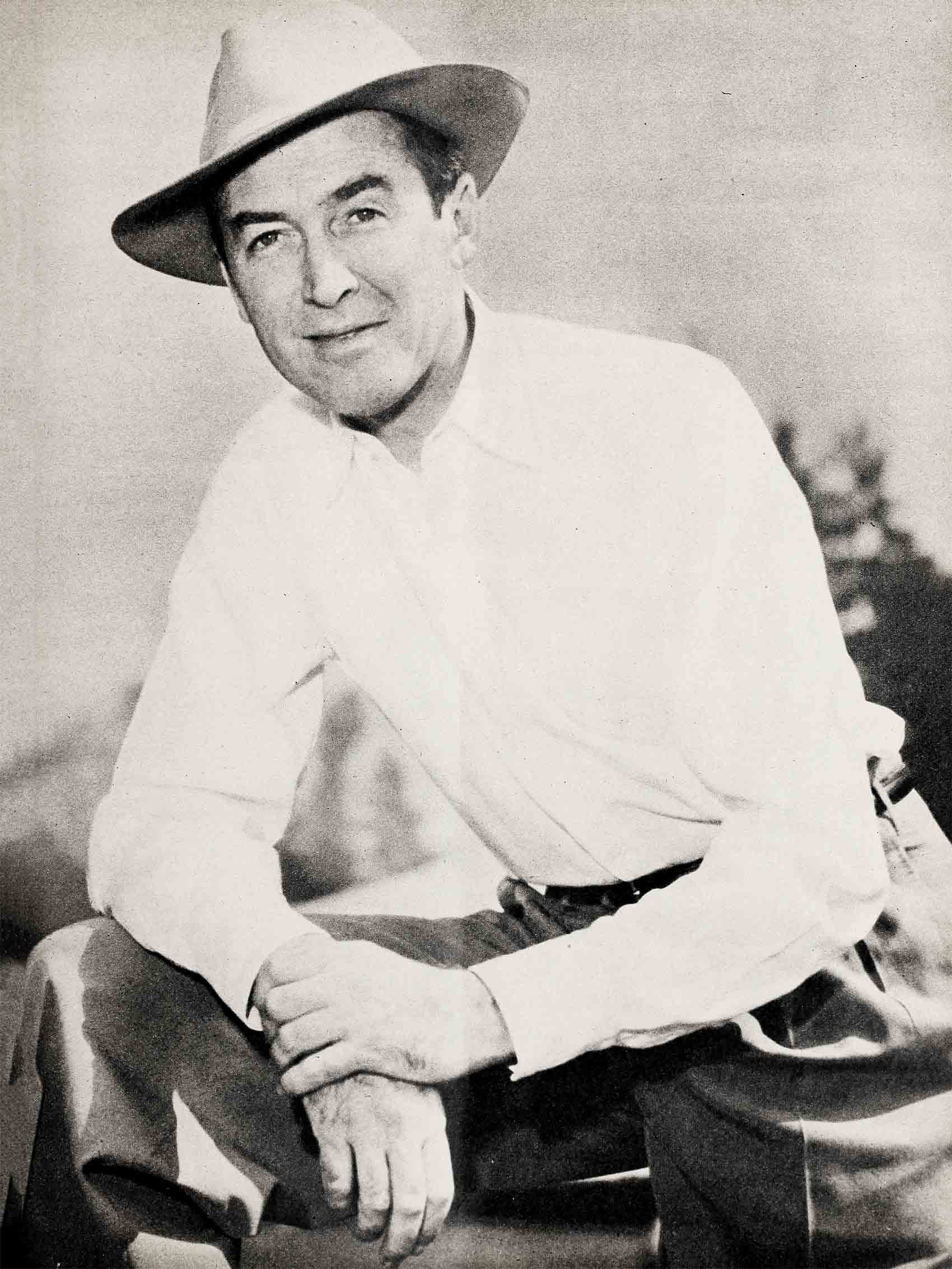
The Truth About James Stewart
An illusion must be shattered now and then, and here and there a fond but misconceived conception disrupted, in the effort to show the real Hollywood. Jimmy Stewart has been called, usually, “the shyest guy in the movies.” This is about as accurate as calling Marilyn Monroe demure. Marilyn certainly can act demure. But she ain’t, intrinsically. And Jimmy has been successfully shy, on the screen, for more than twenty years. Yet he ain’t when he’s being himself.
Jimmy has made a specialty of playing the underdog in pictures, the tall, gawky boy who practically has to sort out his thoughts in public as he speaks. But is he actually? Two months ago the Air Force Association of the United States, in convention at Omaha, listened to an address by one of their members, a former colonel of the 8th Air Force in the European Theatre of Command in World War II. This speaker, addressing an assemblage which included such military air power giants as Generals James Doolittle and Curtis LeMay, was Jimmy Stewart. His words were crisp and to ‘the point. His command of himself was admirable and there was no fumbling for words. What was more, remarkable, he was speaking extemporaneously. His speeches are always extemporaneous.
A guest turned to one of the older members and had to express his wonder. “I didn’t know Stewart could talk so well—and with such authority!” he exclaimed. “All the pictures you see him in, well—the poor fellow is always sort of reaching for his words, never seems sure he is doing the right thing, and everybody’s getting the best of him.”
His listener laughed. “You’re looking at the real man now,” he replied. “He’s not related to his screen self at all. This man you see here knows what he is doing. If he played himself in his movies he’d get the best of the villain so fast all his pictures would be over by the second reel!”
In his many portrayals of the perplexed hero, the long-suffering victim who doesn’t even like to strike back at his oppressors because any sort of brutality is against his nature, Jimmy has become one of the best-liked actors in the business; but also one of the least-known, curiously. Who thinks of Jimmy as a strong individualist?. Practically no one. Yet he is as independent-minded a man as there is in the industry. It wasn’t because he was shy that he didn’t marry for his first fifteen years in Hollywood. It was simply because he hadn’t found the right girl. But having found her, there was no hesitancy. Take the word of the girl, Gloria Hatrick McLean:
“We were having dinner and Jimmy simply asked me to marry him. It was his birthday. He made it seem not only a romantic, but a logical thing to do. I wasn’t a bit stuck for an answer.”
Gloria might have added that the proposal took place at the dining table in his home—the quite ordinary, two-bedroom house he bought soon after coming to Hollywood, and in which he lived for fourteen years while many a star, not half so successful as he, was moving from one wide-flung mansion to another in the best spendthrift traditions of Hollywood.

“This suits me,” Jimmy used to say. But in those days, Jimmy didn’t spend much time home. As he says today, “The best thing about being married is that it makes the home really home. Before I was married I would rather be any place than home. After the marriage—well, that’s where you’ll always find me now!”
He and Gloria didn’t buy their house until they had medical advice that their twins were on the way and realized there would soon be four children in the family. When they first saw their present thirty-eight-year-old mansion, Gloria didn’t like the ivy-covered walls.
“It looks like a dormitory,” she said.
Jimmy thought a minute—about the twins and the boys, Ronald and Michael. “What else is it going to be?” he asked.
So they bought the house and the ivy still grows over the walls. Jimmy is by no means a martinet at home. But neither is he the self-effacing husband or father many of his fans imagine him to be. There is a lot of love used in raising the children—also discipline. There is warmth and understanding and there are spankings. The author of this policy and its chief administrator is Mr. James Stewart. And no one who sees him running his family will be reminded for a moment of the neutral-type individual he plays on the screen so successfully. Jimmy takes his duties as a father most seriously. When he was asked how marriage had changed him his quick answer was simply, “I have become the father of four children.”
Most of Jimmy’s ideas about marriage and raising a family are on the definite rather than indefinite side. It may come as rather a surprise to hear him admit he is a strict sort of father—no one ever thinks of Jimmy as any sort of “heavy.” As a matter of fact, he isn’t, in that sense. “I am strict but fairly so,” he holds. “I was brought up by strict parents and feel that it is important that children are properly supervised. It builds character and self-control.”
When a man marries a woman who has children from a previous marriage he is often tempted to retreat from any attempt to discipline these youngsters. All of Jimmy’s friends agree that he makes no differentiation between his own twin girls (who are only tots) and the older boys by Gloria’s first marriage. Yet harmony in the family is so evident that people often ask Jimmy how he won his children’s affection. His answer is simple. “I didn’t feel that I ever had to win their affection. It just ‘came naturally. We are a family,” he said.
Jimmy never considered himself a romantic and he doesn’t today. “I’m romantic in the sense of appreciating the outdoors, a beautiful night or good music,” he says. “But I’m past the Joe College days.”
Yet when Jimmy talks about marriage or women in general it is apparent that Gloria is never far from his mind. If someone asks him for the name of the most glamorous actress he ever worked with he shrugs his shoulders and replies that he wouldn’t think of putting himself on the spot by answering such a question. But ask him who Hollywood’s most exciting woman is and he has a quick, two-word answer: “My wife.”

Jimmy Stewart, so repeatedly called a shy, diffident man (and there will be more stories claiming that is so), does not bother to tell anything but the truth, and in Hollywood the truth does confuse some people. A writer asked him once if he were easily embarrassed and Jimmy replied, “Yes, when there is something to be embarrassed about.” The trouble is that this first writer wasn’t around when another writer asked Jimmy if he liked love scenes. “I certainly do,” quoth Jimmy!
It is true that in the art of social communication Jimmy is a listener rather than a speaker, but this may not be at all a natural trait, according to those who know him best. “He is forced into listening because he doesn’t like to outshout the other fellow to get himself heard,” reports
a friend who has known him for twenty years. “But if Jimmy enjoys the topic being discussed and there is a give and take to the conversation, he is a darn interesting talker. If he weren’t he’d never be able to get on his feet at such gatherings as the Air Force Association, the Boy Scouts of America conventions, and any number of national meetings, and make wonderful speeches.”
A lot of people have noticed that Jimmy is nervous and uncomfortable in a crowd. What they forget is that the word “crowd” when mentioned in reference to a celebrity should never be used so simply. The crowds that stars find themselves in aren’t just crowds in the static sense, a gathering of many people in one spot. These are masses of people who are always moving and closing in on the celebrity; you have to be such a celebrity and feel the pressure increasing from all sides to really appreciate what it means to be a Jimmy Stewart caught in a “crowd.”
Jimmy has a simple answer when anyone asks him what makes him most uncomfortable when in a crowd. “The crowd.”
Perhaps there is one more aspect of Jimmy which could do with clarification. He talks slowly, he stands with an easy balance most of the time, and it would seem that he is never under strain. Yet here is Jimmy’s own opinion of his temperament. “I am relaxed outside, tense inside,” he says.
No person is perfect. Jimmy isn’t either. He knows, for instance, that he is terribly forgetful. He is deeply grateful that Gloria accepts this trait about him with understanding and tolerance. As a matter of fact, Jimmy’s forgetfulness, if it is the same type which often strikes hard-working actors, could come from his very ability to concentrate on his work.
Maybe it should be recorded here that there was a day, just a few months ago, when Jimmy was actually shy. He admits this himself. He was sitting in Romanoff’s restaurant when one of the waiters approached and said that another diner would like to meet him. The waiter pointed out the man to Jimmy. It was General Charles Lindbergh. Jimmy rose and went to the famous flyer’s table.
“I was-so nervous at meeting this great American that I talked a blue streak and can’t remember what I said!”
It is hard to get Jimmy rattled and it is hard to get him angry. Sometimes people will try. Any attempt to get him to gain publicity benefits from his war record (leading his own squadron of bombers over Germany) is the surest method of getting his dander up. On this subject he has turned white and hammered his fist on a desk top for emphasis. Jimmy the soldier and Jimmy the actor are never going to be confused with each other if he has his way. Nobody who knows him has any doubts that he will have his way.
But little things have never irked him. He used to be the target for a persistent autograph hunter who would besiege him repeatedly at every opportunity. When Jimmy finally wanted to know why the boy needed so many of Jimmy’s signatures the boy replied with that old witticism about being able to get one autograph from another famous actor for six of Jimmy’s. Jimmy, who had already signed his name once, quietly signed it five more times.
Maybe instead of calling Jimmy Hollywood’s shyest actor he should be called the happiest. He loves his work and he is that rare phenomenon—a highly paid actor who has never been heard complaining about being in the ninety per cent plus tax brackets. Nor has he ever tried to incorporate himself into a company in order to cut his tax payments down to a twenty-five per cent capital gains basis permitted by the Treasury Department under certain circumstances.
Oh, there will be deductions, all right. He will be entitled to and will take the deductions allowed a married man and a father who is the head of his own household. Even so the government will do nicely. And that will be all right with Jimmy. Mostly, everything is.
Someone asked him the other day if he felt that he had been lucky. “Yes,” he said. “However, I feel that I have worked hard and honestly to help my luck.”
Thus spake “The Shyest Man in Hollywood,” who, of course, is nothing of the sort, as he or any of his friends will be very glad to tell you.
THE END
—BY LOUIS POLLOCK
James Stewart can be seen in Air Command (Paramount) and The Man From Laramie (Columbia).
It is a quote. MODERN SCREEN MAGAZINE JANUARY 1955




